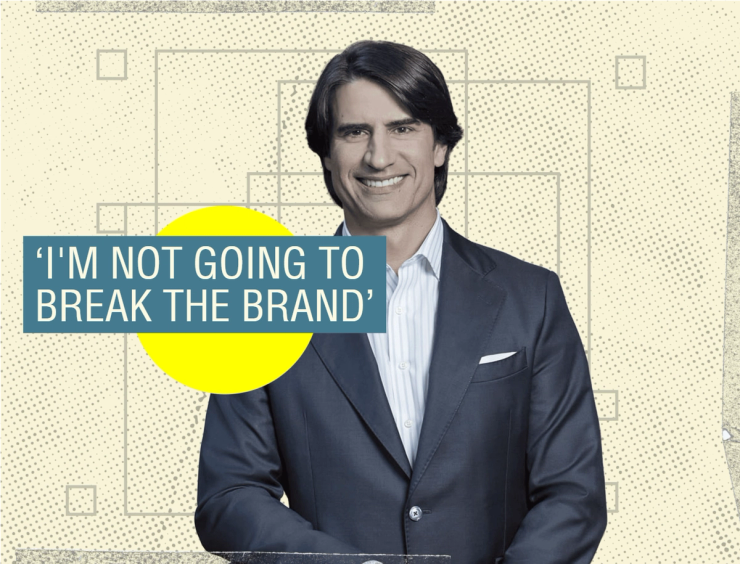The Signal Interview
Alejandro Reynal was an engineering student at the Georgia Institute of Technology when he met his first CEO.
Roberto Goizueta, the Cuban exile who ran Coca-Cola for 16 years until his death in 1997, recognized the Spanish-born Reynal’s name and spoke to him in their shared language before giving a presentation on campus.
Goizueta invited Reynal to sit in the front row of the auditorium for his speech, during which he dedicated a favorite line from the Spanish poet Antonio Machado to his new acquaintance. Translating from memory, Reynal recites: “There’s no path in life; you make your own as you walk.”
“That small act of kindness… inspired me to be a CEO,” says Reynal, who joined Coca-Cola after graduation. “I want to impact others like he impacted me.”
Reynal’s path since then has taken him through management roles in Telefonica to his first CEO position at the CRM services business Atento, then the top job at Apple Leisure Group, a travel business owned by Hyatt Hotels. In 2022, he was named CEO of Four Seasons Hotels and Resorts.
The appointment brought him into the circle of three other veteran CEOs: Bill Gates’ Cascade Investment owns more than 70% of the private company, with smaller stakes held by an affiliate of Prince Alwaleed bin Talal’s Kingdom Holding and the Four Seasons founder Isadore Sharp. It’s an ownership structure that encourages long-term value creation, he says, without revealing much about his interactions with the three men.
The job also came with a challenge: how to find growth while taking Four Seasons into new countries and categories, without diluting its premium positioning or confusing its clientele about what the company stands for.
Finding ‘intentional growth’ from Dubai to Koh Samui
“One of the advantages, and disadvantages, with a brand as powerful as Four Seasons is that you could do many things with it, but then you run the risk of overstretching the brand,” Reynal notes. His focus instead has been on “intentional growth,” he says: “I’m not going to break the brand because I’m just going to be very intentional about how I expand my portfolio.”
His most important decision was to focus all the company’s efforts on the Four Seasons name, on which it had already built decades of brand equity, rather than launch an “ultra luxury” category as Ritz-Carlton has with Ritz-Carlton Reserve.
“I admire brands like Hermès or Ferrari, which are monobrands like ours that have this deep-rooted sense of heritage, tradition, but they continuously push the envelope,” he says.
Having taken that decision, Reynal’s next question was: “[Where] do we have a right to win?”
Enough of its guests value the way of life they sample in its hotels and resorts to allow it to operate dozens of branded residences, which reported more than $2.1 billion in sales last year as Reynal unveiled new projects from Dubai to Istanbul.
Four Seasons already offered private jet trips when he arrived, but he has begun offering headline-grabbing new “journeys,” such as a $188,000 tour of the Maui, Taormina, and Koh Samui resorts where HBO filmed The White Lotus. And he has developed a maritime business: The first Four Seasons-branded yacht will set sail next spring, with just 100 suites. (“We want to mimic a small boutique hotel,” Reynal says.)
“Would we do anything outside this ecosystem? No,” he insists. With the offerings it already has, “We have the power to create these luxury ecosystems where guests can stay, can live, can travel with us. But that’s the extent. I’m not going to get into any other businesses.”
There is no guarantee that a company that operates high-end hotels will be equally successful at running Adriatic cruises, multicountry jet itineraries, or luxury apartments. So Reynal challenged his team to consider which of his brand’s expanded offerings it could provide well, and which would be better done by outside experts.
He brought in a veteran real estate executive to run the residential business and has partnered with specialist operators for its jet and yacht trips. “The service piece we provide, because that’s what we know,” he explains.
AI, ‘EI,’ and the technology behind ‘unscripted care’
Service is what differentiates Four Seasons from its competitors, Reynal maintains, saying that its Coke-like secret formula lies in its approach to hiring. It carries out multiple rounds of interviews to screen candidates for “attitude,” he says, and then trains them for the skills it needs.
But the company knows that it cannot script every interaction between its employees and its guests. The third element of its approach to talent is a service culture that drills into staff the “golden rule”: to treat guests the way they themselves would like to be treated.
Four Seasons is hardly the first business to preach that principle, but Reynal says it sends a clear message to employees: They have the autonomy to determine what is best for customers. “We hire you because of your attitude and service skill set. We train you for the job, but ultimately, the culture enables you to make the right call with the guest.”
When Reynal became CEO, he emailed his 50,000-plus employees with three questions: What was working well? What would they change? And what advice did they have for him?
What he heard back was that he should be himself, preserve the Four Seasons culture, and overhaul the company’s technology.
Reynal sees the opportunity for AI to “take service to the next level” and, counterintuitively, to make it “even more human.” He has invested heavily over the past three years in improving Four Seasons’ data infrastructure, so it can mine the information it has on guests to provide a more personalized experience.
“I see technology in luxury hospitality more as an enabler versus a substitute,” he says. Staff involved in some pilot projects now receive discreet prompts about loyal customers’ preferences on their mobile devices, he says by way of example.
Four Seasons will distinguish itself if it can combine AI with EI, or “emotional intelligence,” he says. The human touch still matters, and every interaction with a guest should feel like “unscripted care”: “We will have our service standards and so forth, but ultimately, it has to be authentic.”
Luxury tailwinds and authentic connections
Reynal acknowledges that he has been helped by the “tailwind” of robust demand from some of the world’s biggest spenders. Providers of high-priced hotel rooms and similar services have not seen the slowdown that has hit the share prices of some leading luxury goods groups, and he sees no downturn on the horizon.
“I remain optimistic,” he says. “This year is going to be our best year on record” in terms of revenue and profit margins, he adds, and advance bookings suggest that 2026 “is going to be better than 2025.”
But Four Seasons’ growth is not just down to its ability to ride favorable tailwinds, he insists: It has succeeded by being proactive in creating new properties and experiences that can satisfy that growing demand.
Reynal himself has become one of his company’s most loyal luxury customers. The 52-year-old, who rises at 5 am and tries to work out and meditate before breakfast each day, estimates that he spends 150 nights a year in a Four Seasons property, judging them by “the sense of arrival” that the staff provides, and the authenticity of the service.
When it comes to Reynal’s own vacations, though, “there’s not a Four Seasons in every single place that we go.” So when the Miami-based executive takes his children to Valencia to see his parents, they stay in the same hotel that they have visited for years. “They know us,” he says of the hoteliers. “It feels like family… that authenticity, that connection.”
Notable
- Reynal is a believer in “inbox zero.” His role is to enable decision-making, he reasons, and an unanswered email can stand in the way of that, he told Semafor. “I don’t want to be holding [up] any decision.”
- The luxury goods market is holding up — for now — industry leaders told Semafor’s Business of Luxury event in September. With the top 10% of US earners accounting for a record 49.2% of total quarterly spending, “being in the luxury tier definitely protects, to a point,” one executive said.


